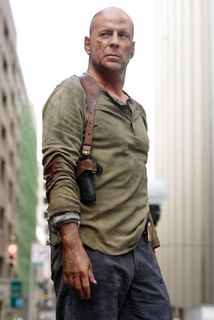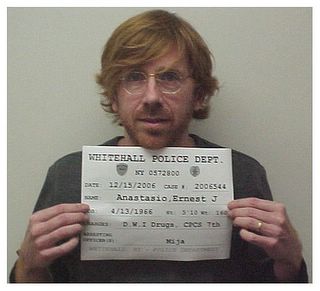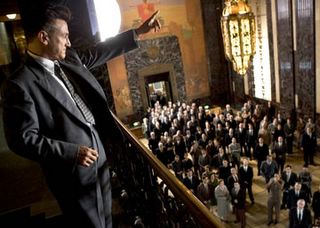In June of 2000, I received my Bachelor's Degree in History (with a minor in English!) from UCLA and had no idea what to do with myself. None. I thought, for a short time, that I might be able to make a living as a freelance journalist, but the website I had been writing for went out of business and the editors of PREMIERE Magazine stopped taking my phone calls.
So I moved back home with my parents and took a job working the information desk at my local Barnes & Noble. After a few weeks, my father asked me to go out for coffee with him. In addition to a strong need for an afternoon caffeine fix, there was a buried agenda for this little excursion to the closest of Irvine's approximately 250,000 Starbucks franchises. He wanted to ask me what I planned to do with my life, now that I was a legal adult with a college degree who, by all accounts, should no longer be living in his house and mooching off all of his cool stuff.
I promise, I'm going somewhere with this. Bear with me a few more sentences.
Anyway, we discussed my options and wound up settling on a few basic principles: Mainly, I would work and save up money and apply to graduate school programs (in what subject, I'd decide later).
The idea wasn't so much
what I was going to do. My dad (quite rightly) felt that I should be doing
something. Planning ahead provides some added convenience, but also the illusion of certainty. By working out the details of what I'm going to do in the next week or month or year, I can slowly delude myself into thinking that I have some measure of control over what will actually occur during that timespan. This, of course, is nonsense. Those two years at grad school seemed like a logical answer to a pressing question ("what now?"), but of course they only made my future
more uncertain and harrowing. Now I'm two years older and strapped with egregious debt for a degree I don't use.
But I don't want to just talk about missteps in my recent background. I think there's something universal about this phenomenon. I think, most of the time, when we think operationally, and attempt to plot out actions far in advance, we err by making false assumptions. In essence, we try to fit difficult, complex situations into neat, tidy formulations.
This is only natural. It's a defense mechanism. Everyone does it all the time. Here's a good example: We think of "mistakes" as lessons, instructions on how to avoid problems in our future behavior. You know, "learn from history or you're doomed to repeat it," all that crap. Of course, this is total bullshit.
Of course it is! In point of fact, people tend to make the same stupid mistakes over and over again, both in their everyday lives and in international diplomacy. We're continually attracted to that same incompatible types of people and same toxic environments. We keep arming military leaders only to have to disarm them a decade later. People still fall victim to fucking
pyramid schemes and
Nigerian e-mail scams. Let's face it...If humans really learned from mistakes, after the past few thousand years, we'd all be a lot fucking smarter. But we have to think this way. Otherwise, life is a hopeless series of harsh toils and cyclical relationships from which we learn very little.
The self-help industry provides another, more dramatic example of what I'm talking about here. These phony guru assholes (of the sort I've discussed previously
here and
here) never design programs to treat specific maladies. There's no "depression" guru who teaches you how to pull yourself out of a deep funk vs. a humility guru who teaches you how to be less aggressive and forceful in your approach to relationships. There's just a bunch of guys who peddle general programs designed to help everybody equally. As if every different person's individual struggles could be compressed into one or two basic life lessons that would improve all personalities.
What if I have exactly the opposite problem as another person? Could the same few techniques really provide for mutual happiness? And if so, wouldn't these techniques have to be, by definition, extraordinarily general (in essence, biologically-based, along the lines of deep breathing)?
Which brings me to GodMen, conservative author and "comedian" Brad Stine's movement to inject a testosterine-fueled, date-rapist-sympathizing, "Man Show" strain into contemporary American Christianity.
Many fine blogs have already discussed the GodMen movement with frequently hilarious results. And with good cause. It's basically a combination of an afternoon high school Bible Study group and that '90s male bonding movement that found grown men camping in the woods together talking about their fathers, crying and baying at the moon.
(It's odd for me to consider, but there may very well be people reading this blog right now who are
too young to remember this Male Pride idiocy. For a while there, it was a hot topic in pop culture, absolutely pervading sitcoms and late night monologues. Some of Tyler Durden's ideas in
Fight Club about consumer society neutering the natural male essence descends directly from this movement.)
Here's a typically brain-deadening post from Stine's "blog." Please don't read the following if you'll need to do any heavy, strenuous thinking for the rest of the day. Reading some Dean Koontz later might be okay, Michael Chabon would be pushing it, but Thomas Pynchon will be right out:
I was performing at a church in Pennsylvania for what was supposed to be a"Men's" event. I said supposed to be because on the way to the event the coordinator told me that some of the women at the church wondered if they could slip in to see the show. Apparently they were fans of mine and felt left out."Apparently" they were fans? Maybe they were just curious as to why a guy would come to their church just to speak to the men? This isn't too difficult to imagine. "What are they going to talk about at church that necessarily couldn't involve women? Jesus' tips for proper penis hygeine? The youth pastor's secret homosexual fantasies? God's preferred brand of radial arm saw?" No, no, if any chicks want to sneak in, it could only because they're
way way into the hilarious comedy of one Mr. Stine.
Now folks, the last thing I am is anti-woman. I love women, need women, and respect women. Heck, my mom's one!Man, chauvanists are easy to spot. They always use the same bogus lines! Every time! "I don't hate women! I love my Mom!" is to misogyny what "I have lots of good black friends!" is to racism.
But it really ticked me off that they would think it ok to enter our man cave.Tee-hee. Brad hates it when women try to enter his man cave. That's for dudes only, dammit!
Men have very few events that they are allowed to have just for themselves w/o women feeling we are being insensitive. Women want to get into everything that used to be exclusively male including our sports. From little league, to fireMEN , women want in.Yeah! Just because we want to cruelly bar girls from playing in Little League and persist in using outdated, female-exclusionary language, people insist we must be insensitive to women! Hey, I love women! I just think I'm much, much better than them.
Women want to get into Augusta which is a private golf course where the Masters is held. ( I know you guys know this but this is for any women who have sneaked onto our site and are reading this.)In case any women "have sneaked" on to your site? Dude, Brad...You're gay, man. It's time to take a deep breath and come on out. You'll feel better. Seriously, I've never met a single straight guy that's this keen on keeping women away from himself. "Don't come on my website, harpies! You'll hear my super-secret insights on why you're incapable of understanding the extremely complex, nuanced sport of golf!"
You know, Bradley, most heterosexual men...they kind of
like having women around. Sometimes, they'll go places and complain
that there aren't enough women. Hence the term, which I'm sure you've heard bandied about at some of your ManChurch events..."sausage fest[ival]."
Ladies, why can't we have a tournament or PRIVATE club just for men?Brad, you do. The Ultimate Fighting Champsionship and the Hair Club for Men. Both are men-only, so I'm sure you'll be very comfortable there. (Also, Hollywood is absolutely
littered with day spas and other assorted themed recreational haunts that will most likely be filled with lean, hairless men who may be happy to spend some alone time with you, if you'd only stop by for a quick meet and greet and leave your inhibitions and hang-ups at the door.)
Men are better golfers and need to compete with each other for the shear sportmanship of watching another man crumble at the sight of our superior drive.Ha ha..."Shear sportmanship"...0 for 2, buddy.
Brad commits a common error in logic here. Because the best male golfers would most likely defeat the best female golfers in a game (I say most likely, but I don't know enough about golf to be certain about any of this), Brad assumes this means "men" are better golfers than "women." This, of course, is stupid. I'm a man, but there are literally
millions of women alive today who could defeat me in a game of golf. And that's if I took a few lessons first. Without any practice, I'm certain most female
infants could blow me away over the course of 9 holes. A solid female golfer could, I'm certain, kick Brad's ass all over Augusta.
When you get to the upper, upper eschelons in the sport, where subtle differences in ability make the difference between winning or losing, then brute physical strength becomes more crucial. Fine. Granted. This still doesn't mean that all men are stronger than all women, but very fit men are capable of becoming stronger than their very fit female counterparts. But to say that "men" are better than "women" at golf, and that this is an excuse to exclude women from golf clubs, is patently ludicrous. So ludicrous, I can't believe I spent a paragraph in response.
Saying men are superior than women in certain areas isn't insensitive...it's true. Just like women are better at some things then men. You would have to be a tenured professor of sociology at Berkley to be too stupid to grasp that.Okay, here we arrive at the part that connects to my earlier point. Brad's making cheap generalizations here that are totally, brutally meaningless, but he has a larger purpose. He's attempting to sell an audience a lifestyle, a plan he's devised for living a fulfilled life. It includes the fervent worship of his choice of deity teamed with constant expressions of his personal conception of "manhood," which winds up looking an awful lot like insensitive chauvanistic domination of subjugated women teamed with an arrogant, hostile personal demeanor, obsessive sports fandom and far-right, socially conservative politics.
It has nothing to do with how "men" should behave in general, any more than his silly assertions about Sociology courses at "Berkley," about which it's clear, by spelling alone, he's entirely ignorant. Naturally, this is an exaggerated case, a real grade-A moron with a delusional self-image and no shame who's masquerading as a philosopher. But the principle can be extended to pretty much any case where one individual doles out advice to a vast group of people, or attempts to objectively plot the course of important future events.
This is why I always mistrust books with names like "The Six Principles of..." or "The 10 Things You Need to Know..." How the fuck do you know the ten things
I need to know? We've never met, assface! Also, "think tanks" and panels like this ludicrous "Iraq Study Group." The time to study Iraq has passed, gentlemen. You slept through that class. Now it's time to
get the hell out of there. When they form the "Iraq Emergency Exit Group," I'll start paying attention. These self-help shysters, these partisan beaurocrats, these professional "thinkers" guided by nothing but party and pre-set ideology all begin by making huge, silly assumptions and then forcing the facts to fit the frame that's already in place.
So now let's consider the case of Silvestre Reyes, the new Democratic chariman of the House Intelligence Committee. He seems like an alright guy to me, certainly better equipped for the job than Jane Harman or that possibly-corrupt ex-judge. Unfortunately, he still can't name the religious affiliation of Al Qaeda. (Can you, faithful reader?)
From Digby comes this interview between Reyes and Kevin Drum:
The dialogue went like this:Al Qaeda is what, I asked, Sunni or Shia?“Al Qaeda, they have both,” Reyes said. “You’re talking about predominately?”“Sure,” I said, not knowing what else to say.“Predominantly — probably Shiite,” he ventured.He couldn’t have been more wrong.Al Qaeda is profoundly Sunni. If a Shiite showed up at an al Qaeda club house, they’d slice off his head and use it for a soccer ball.That’s because the extremist Sunnis who make up al Qaeda consider all Shiites to be heretics.I think I'm even more unnerved by this than Drum. Not only that the guy who's going to be heading up the House Democrats' leadership on issues relating to Bush's War of Terror doesn't know that Osama bin Laden's a Sunni. But that he would imagine
any Muslim political organization with a stake in Iraq's future would be composed of both Sunni and Shiite. They're engaged in a Civil War right now. How could Al Qaeda contain
both Sunni and Shia sympathizers? It couldn't! He really ought to know that, even if he can't pull up the name of the specific group from which Al Qaeda derives its members. (Although, let's face it, he should know both. We've been declaring war on these guys for five years now.)
Why bring up Reyes' outrageous ignorance? Because he doesn't feel like he needs to understand the specifics, clearly. If he did, he would by now. He certainly has the resources to find out about Al Qaeda, and he must be a reasonably intelligent individual. Drum previously asked these questions of hawkish Republican Representatives, and they couldn't even describe basic differences between Sunni and Shia. (And he's not asking for doctrinal differences or historical minutae. This was big stuff, like "which one controls Iran?" and "which one includes al-Sadr?")
And Digby reminds us of this gem from Presidential hopeful John McCain:
“One of the things I would do if I were President would be to sit the Shiites and the Sunnis down and say, ‘Stop the bullshit,’” said Mr. McCain, according to Shirley Cloyes DioGuardi, an invitee, and two other guests.McCain, in his astounding ignorance of the politics and history of the Middle East, thus tries to squeeze a difficult and unique situation into a familiar formula. He's imagining, I suppose, some kind of Old World treaty-signing, wherein everyone gets together for tea and biscuits, compliments one another on a splendid bit of soldiering in this or that smashing little battle, exchanges swords or revolvers and parts on good terms in mutual comfort to their various chateaus and ancestral manors. Like we could invite Osama, Sadr, Maliki and the Saudi Royal Family (cause they get invited to all Bush family events) to Appomattox and just talk some sense into 'em. Using, presumably, pie charts.
Reyes may have a different conception of how to deal with these troublesome Iraqis than McCain, but judging from his ignorance of the situation, I can't imagine it's any more accurate.
So, okay, this is a combination of problems. In addition to the very human propensity to plan without knowing what one is fucking talking about, this also evidences America's ongoing hatred of expertise, academia and intellectualism. Conservative pundits are now quite brazen in their declarations that universities make you stupid. (Doesn't Brad Stine imply that very thing above about "Berkley"?) Because knowledge can't help but inspire change, and guys like Brad Stine fear change. So they fear knowledge and try to keep people willfully ignorant, just like them. What he and many other Americans teach is, in fact, a proposed "alternate" system of education, founded on the policy of letting you believe whatever you want and actively encouraging you to filter out any material that might conflict with your worldview before it has a chance to make you feel doubtful or uncomfortable.
Feel demasculated by women who want to pursue their own goals outside of your petty emotional needs? You should just
reclaim your manhood by claiming to be better at everything! Upset that evolutionary theory leaves you feeling empty inside, as if you and everyone you know are just brief blips on a cosmic screen of unimaginable size? Comfort yourself by
ignoring all available evidence and baselessly insisting it's wrong! Inconvenienced by the need to conserve energy, in order to divert environment catastrophe?
Just claim that we don't have enough facts yet! Homosexuals cause you to personally feel discomfort, embarrassment or a personal sense of shame?
Just discriminate against 'em! It's your right as an American.
All of that and more plays into it. It's just frustrating to see important things like war and economic policy run in such an abysmal, thick-skulled way. Our press, our government and our citizenry has become a lot of morons who have no clue, bloviating endlessly, misapplying any lame, discredited evolutionary psych theory or sports metaphor or management cliche available to get a handle on problems already far out of their control. I know it's only a few weeks until Democrats actually take control, but my fatigue of this insipid war set in
years ago already. It feels at times like we will never see the end of this conflict we regrettably started.






